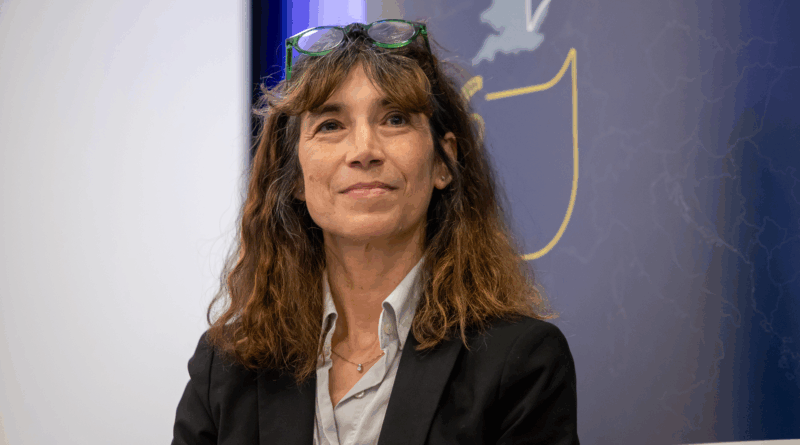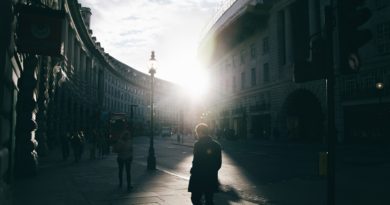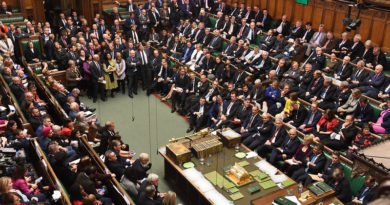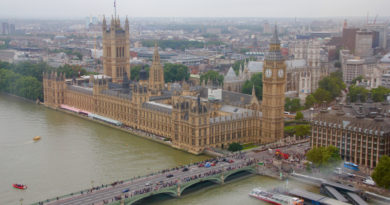MP Manuela Perteghella on Shakespeare, belonging, and the EU-UK relationship
Sometimes a passion is a guide to destiny. That seems to have been the case for Manuela Perteghella, an Italo-British academic specialised in the translation and adaptation of drama and poetry, who last year was elected as member of parliament in William Shakespeake’s birthplace, Stratford-on-Avon.
Dr Perteghella decided to enter politics after the 2016 Brexit referendum, which shook the country and left Europeans in the UK in a legal limbo for years.
She is the first woman to represent the constituency and the first non-Conservative to have won the seat since 1950s.
Perteghella was born in Rome, where she grew up after a brief move to Nigeria for her father’s job. Her passion for English and Shakespeare led her to study languages and apply for universities in the UK, where she moved in 1993.
After graduating in English and theatre studies at the University of North London, she pursued a master’s and a PhD in literary translation at the University of East Anglia specialising in theatre translation as staged and performed.
Perteghella has been senior lecturer at London Metropolitan University, principal tutor at the University of Warwick and associate lecturer for the Open University. She has also published research in literary translation and worked as a curator of community arts projects.
She lives near Stratford-upon-Avon with her family. “This is where I call home,” she told Europe Street. In this interview, she discusses Brexit, becoming an MP, and the ‘reset’ of the EU-UK relationship.
What was your first experience of the UK?
For people in my generation, London was the place to be. We all wanted to come here, experiment and experience ‘Englishness’ in the sense of tolerance and open-mindedness that was so special compared to other places. In those years, the United Kingdom, and England in particular, was very welcoming and Europe-oriented. I remember the enthusiasm of my university friends after the 1997 elections, when Tony Blair won by a landslide, and the great sense of hope for the future of this country and for a better world. This was combined with my love for the English language and literature. After specialising in the translation of British drama, including Shakespeare’s work, it is a huge honour now to represent Shakespeare’s birthplace in parliament.
Looking back, what are your most vivid memories of Italy?
I have beautiful memories of my school years in Rome and going out my girl friends. It’s the friendships that last forever, even after one leaves. But I also recall the tragic murders of anti-mafia judges Giovanni Falcone and Paolo Borsellino [two prominent judges assassinated in Sicily in May and July 1992]. Political crime entered everyone’s homes and hearts, igniting a desire to fight the mafia and corruption, to say ‘this must never happen again’. It was a moment of mourning for the entire country, for both citizens and the political class, which also planted a seed of hope that things could be different. Those tragic events marked a major shift for Italy, a sort of coming of age of civic conscience.
When did you decide to enter politics, and why?
I have always been interested in politics and involved in local campaigning on issues such as the environment, climate change, the state of our rivers, and the right to education. But I only got involved in party politics after the Brexit referendum. It was then that I joined the Liberal Democrats, because I felt I had to do something to change the debate about immigration and the EU. Grassroots politics led me to run and be elected as councillor in the Stratford-on-Avon district in 2020. After naturalising as a British citizen, in 2022, I was selected to run in the 2024 general election.
Why did you apply for citizenship only after Brexit?
Despite having settled status [the legal status to protect the rights of EU citizens living in the UK before the withdrawal from the EU], I felt that applying for citizenship was the safest option for me and my British family to protect our rights here in the UK. Most importantly, I have lived here more than anywhere else. This is my home and I have felt British for a long time, and I wanted to contribute to national politics.
How did you persuade people to vote for you?
We run a good and positive electoral campaign. The three main themes of our campaign were the environment, healthcare and the NHS, and local transport. Only in parliament we can raise people’s issues in these areas. Canvassing was a wonderful experience. Even if we did not always agree on the politics, the conversation at the doorstep was always respectful, and it is important for me to hear different opinions. I promised to be a very present MP. We are legislators and constituency MPs, where we meet residents for half of the week. This is the part of the job that I like the most because I can help the people I represent with various concerns and injustices.
What are your constituents asking you as an MP?
People care about nature and want solutions to local problems, such as traffic, education, schools for children with special needs and disabilities, and the economy.
And immigration?
In the general election campaign last year, immigration was not a major topic. It came up in the recent local elections but it is not the top concern. People want to be able to see their GPs, to have a dentist in the area, to resolve local problems.
The Labour government recently presented a white paper to further tighten immigration policies. What do you think about it?
It is disappointing, and dangerous, to see the Labour government using an anti-immigration rhetoric. What they proposed with the recent white paper is also self-harming, because they target professional carers and international students, two groups that contribute strongly to the economy. But I want to stress that framing the immigration debate only around the contribution to the economy is also wrong, because a stay-at-home parent, a volunteer and anyone else enriches society. The language that we have heard recently reopened old wounds and reignited the toxic debate of the Brexit campaign, while immigrants have over the centuries enriched massively British society. We need to have an honest debate and my mission will be even more to highlight this.
Aside from being a member of parliament’s select committee on education, you chair the All-Party Parliamentary Group (APPG) on citizens’ rights. What does the group do?
I have always been a supporter of the rights of EU citizens in the UK and of British citizens in the EU. In the aftermath of the referendum, I volunteered with the3million [a group working to protect the rights of EU citizens in the UK] and organised sessions to raise awareness of settled status in my local area with Settled. I understand the emotional rollercoaster because we all went through the same feelings. The APPG existed in the previous parliament and was re-established in this term. Its purpose is to safeguard the rights of EU citizens in the UK and British citizens in the EU. I wanted to be chair because EU citizens still face a lot of problems, starting from the 1.7 million people who have to convert from the provisional pre-settled to settled status, which will grant them the right to remain in the UK permanently. For many, this is not automatic. The APPG also supports UK citizens in the EU, which face new issues having become ‘third country nationals’. We talk to experts and make recommendations to ministers on how to improve the life of people who still have problems, five years after Brexit.
In your views, what has been the most significant change for EU citizens in the UK since Brexit?
In my opinion Brexit has changed the relationship EU citizens had with the UK, with our sense of home and belonging. I’ve been here since 1993 and Brexit was an absolute trauma because the message was ‘you’re no longer welcome’. The relationship with our adopted country was broken and we suddenly felt like guests. Many have left, going back to their country or elsewhere. I believe that link is still broken, so it is important that we have a relationship with political leaders and make a new start to rebuild that sense of belonging here.
What are your expectations from the EU-UK relationship?
As Lib Dems we ask an ambitious new relationship with the EU, starting with an EU-UK youth mobility scheme that will give young people the opportunity to move across the Channel for at least three years. We also ask to establish a new customs union between the UK and the EU by 2030, as this will help businesses and the economy, and we support cooperation on defence to deal with Russia’s threat. Personally, I would like the government to see free movement of people not as a matter of immigration but as a rights-base system that benefits also British nationals.
In three words, how do you see the future for the UK and the EU?
Hope, rapprochement and rejoin.
Do you think the UK will ever rejoin the EU?
In my opinion yes, because it is important for the UK to have partners who care about the future of Europe. The UK has always had a special place in the EU, and it was treated in a special way with all the concessions granted as an EU member. When I speak in schools, it is clear that young people want closer ties with Europe. They know the rights they have lost with Brexit and they want to experience Europe without hurdles, so I hope the new generation will take us back into the EU, where our place is.
Claudia Delpero © Europe Street News, all rights reserved
Photo: Manuela Perteghella at an event at the European Parliament Liaison Office in the UK, in London, May 2025. Photo by Betty Zapata, courtesy of New Europeans UK, a citizens’ rights organisation acting as the secretariat of the All-Party Parliamentary Group (APPG) on citizens’ rights.




